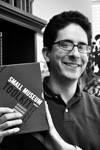by Alli Smith
 Scott Wands is an advocate. He advocates for humanities programming at institutions across Connecticut. He advocates for building strong relationships with and within in the community. He advocates for rolling with the punches. In fact, he just returned from the American Alliance of Museum’s Advocacy Day in Washington, D.C., where he met with five legislators, making the case for continued federal funding and support for museum interests.
Scott Wands is an advocate. He advocates for humanities programming at institutions across Connecticut. He advocates for building strong relationships with and within in the community. He advocates for rolling with the punches. In fact, he just returned from the American Alliance of Museum’s Advocacy Day in Washington, D.C., where he met with five legislators, making the case for continued federal funding and support for museum interests.
Scott knew early that he wanted to work with museums, and so he began his path in that direction at Amherst College, earning a bachelor’s degree in American History. He then entered into the Winterthur program in Early American Material Culture at the University of Delaware, where his tiny class of ten essentially learned to be curators. It was here that Scott realized he wanted to focus on education, and he worked as a museum educator for five years after earning his master’s. He also began volunteering with the Connecticut League of History Organizations (CLHO), where he ran workshops and awards programs. In March of 2008, Scott began his work with Connecticut Humanities (CTH) as a provider of professional development and training.
Connecticut Humanities is a 501(c)3 affiliate for the National Endowment of Humanities, providing grants to historical societies and other institutions across Connecticut for exhibitions and programming. Scott explained that in the early 1970s, when the endowments for the humanities and arts were first created, the arts affiliates at the state level became state departments while the humanities affiliates became independent non-profit organizations with both receiving federally appropriated funds. This funding is decided upon using a formula based on population size for each state. Ninety percent of CTH’s funding comes from state or federal dollars and, as Scott says, “it’s tough to split that pie.”
Connecticut Humanities was successful in its mission, however, owed in large part to the work of Scott’s predecessor Bruce Fraser. For decades, Bruce single-handedly advocated for CTH, emphasizing the importance of state-level support of cultural heritage institutions. The thinking was that an investment in CTH from the federal level allowed for the organization to then invest in heritage and humanities programming, attracting users and infusing the community with tourism revenue. Sadly, Bruce passed away in the early aughts, erasing a needed connection to a network of supporters. The economy also took a dive in 2008, and Connecticut Humanities is still recovering in some ways. A staff of twenty became a staff of six, and the organization has moved to different facilities.
Despite these issues, Scott moved through the ranks of the organization over the years and is now the Manager of Grants and Programs. His daily activities run the gamut, and he highlights the need to be a “jack-of-all-trades.” For institutions seeking grants, Scott provides a start-to-finish service. He assists applicants through the application process, helping them develop project ideas and write their grant applications. He also processes those applications and makes decisions alongside board members on which projects are most deserving of funding. He even assists institutions with final reports they pen.
Outside of the grant process, Scott also implements direct CTH programming. One such program, StEPs-CT, is a self-study curriculum designed to help institutions evaluate their work against national museum standards. The program is based on a national curriculum “Standards and Excellence Program for History Organizations”(StEPs), which was developed by the American Association for State and Local History (AASLH). The Connecticut offshoot was created in partnership with the Connecticut League of History Organizations (CLHO) and the Connecticut Historical Society.
In addition to his work with AASLH on the StEPs-CT program, Scott is also now a board member, which has afforded him a network of contacts from across the country. It is the cultivation of relationships like these, and others, that contribute, in large part, to the success of Connecticut Humanities. This is a never-ending endeavor; seats for state and house legislators, for example, are constantly changing. Scott says, “You are never done reminding people of who you are, what you do, and why it is important.”
Concluding our interview, I asked Scott if he had any final take-aways about his work in outreach and advocacy. His answer? “You’ve got to be adaptable.” With the challenges Connecticut Humanities has faced during Scott’s tenure, it is a testament to his own adaptability that he has been able to develop and maintain successful programming in an ever-changing world.
